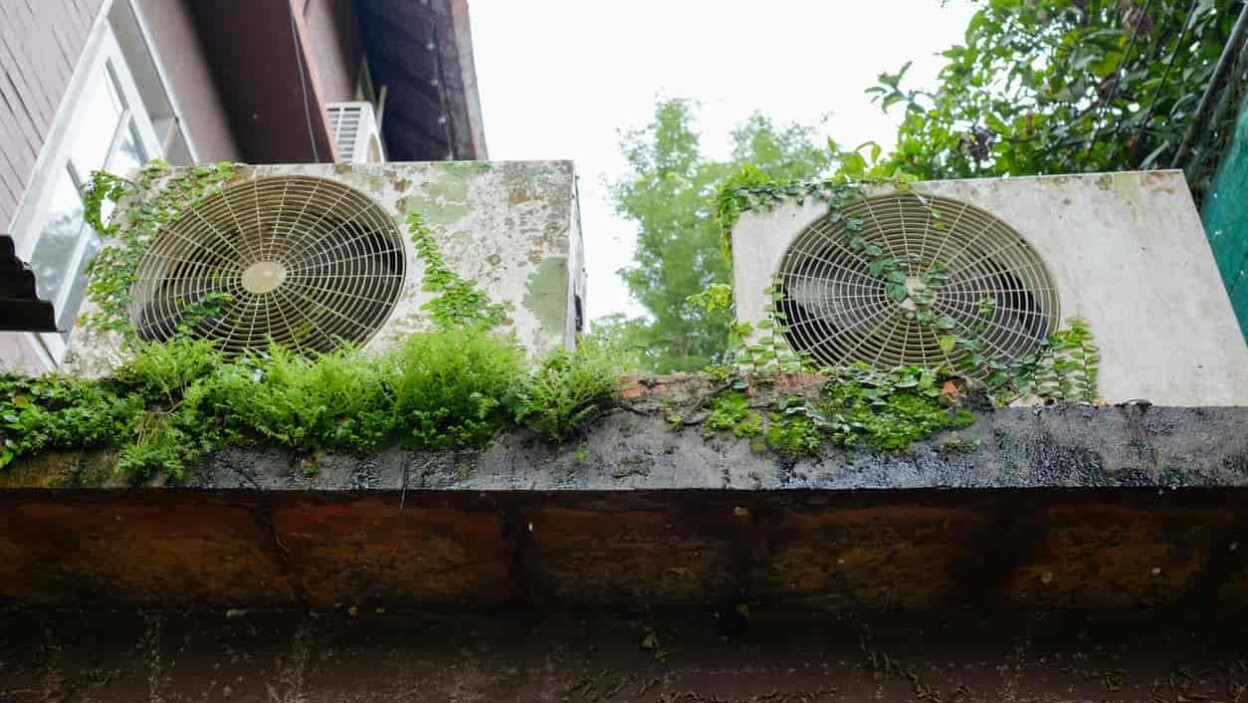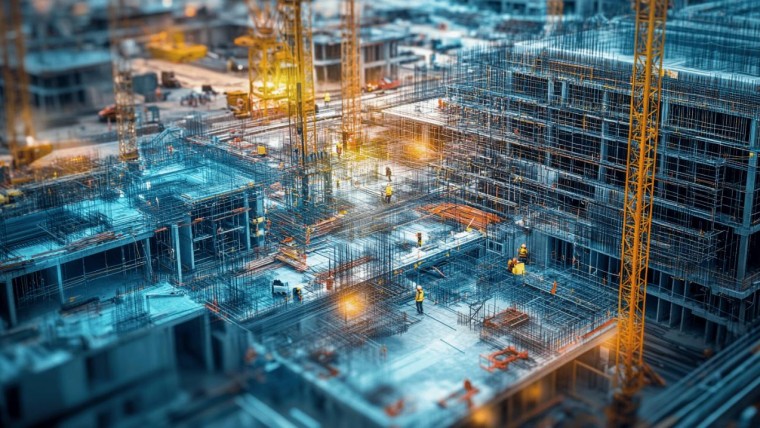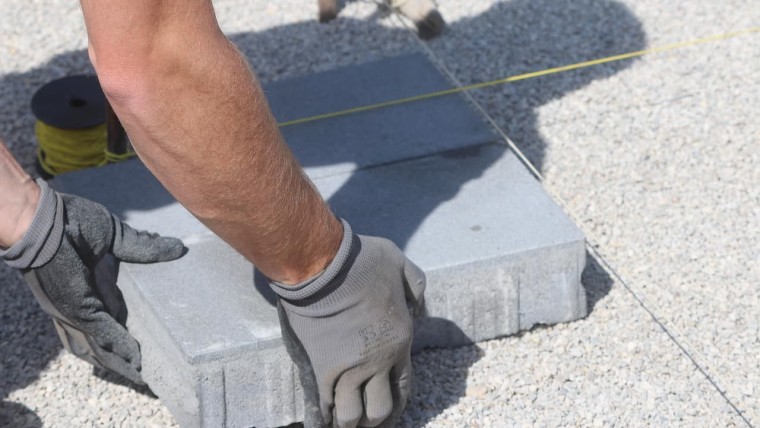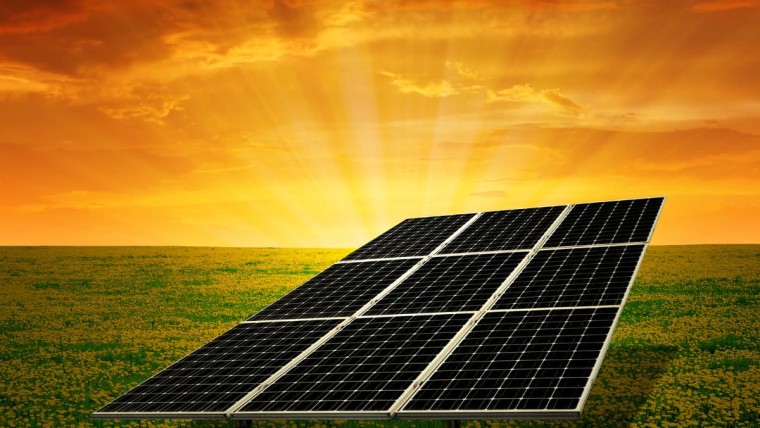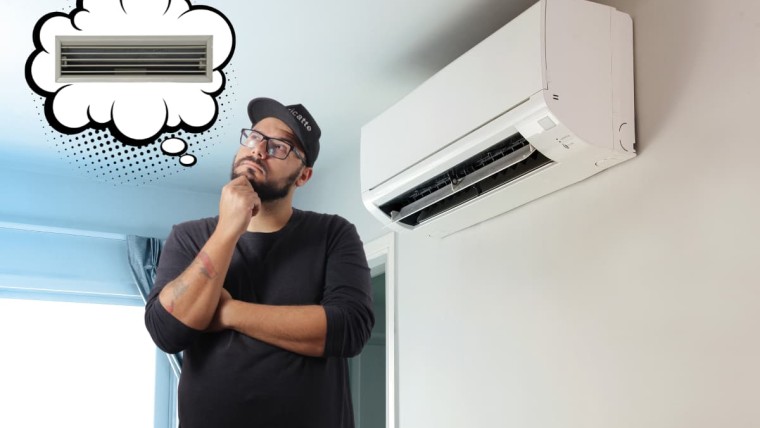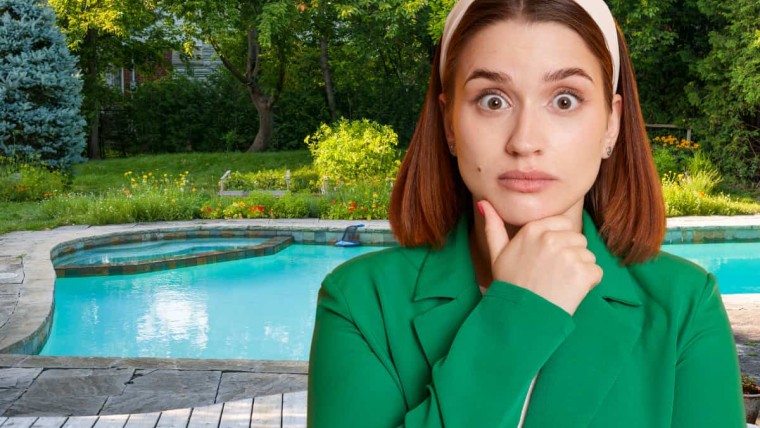The heat pump market is exploding year after year in Europe, stimulated by the environmental objectives of European policies and state aid for energy improvement.
However, the heat pump does not have only advantages. In the following, we present 9 disadvantages of the air-to-water heat pump that could discourage you from choosing it, and we briefly explain why each point can be a blocking factor.
Let's start with the most popular and discussed disadvantage of the air-to-water heat pump.
Noise from the outdoor unit of an air-to-water heat pump
As you know, an outdoor air-to-water heat pump can be either a single package or a split system. In both cases, it is necessary to install an outdoor unit or casing outside your home.
It is this outdoor unit that captures the heat from the outside air, and contains the compressor which is the major component of the refrigeration circuit, and which unfortunately generates noise pollution.
This outdoor unit is also equipped with a fan whose role is to ensure the passage of the air from which the calories are extracted, sucked through the evaporator and then delivered to the front of the unit.
The combination of this compressor and fan results in a sound emission that is qualified by the sound power in dBA provided by the manufacturer. The sound power corresponds to the intrinsic noise produced by the heat pump at the machine itself. The further away you go, the higher the sound pressure in dBA actually felt decreases.
Consequence Noise level: When choosing your air-to-water heat pump, there are several points to consider. You must check that the sound pressure at the first window of your neighbors' homes does not violate the legal limit. You should check that the noise emission at night does not exceed the limit values imposed by your municipality, region or country. In many cases, a certain distance between the outdoor unit and the first wall or window of the neighbor must also be observed.
Notice : It's quite restrictive. Some heat pumps may suit you in terms of power or aesthetics but may be too noisy. Failure to comply with these constraints can quickly land you in court, depending on how tolerant and loud your neighborhood is. But some brands, such as NIBE or Daikin for example, are excellent on this point.
An often ugly exterior grouping that makes facades and gardens look ugly
For the same outdoor air-to-water heat pump unit mentioned above, you have a choice of locations:
- Along the front of your house
- In a place in the middle or in a corner of your garden, hidden by vegetation
- Between two spaced walls
- In a recess
No matter what, the majority of these outdoor groups are just plain ugly. You don't want to decorate your beautiful green space or your exterior walls with these ugly things.
Consequence In order to preserve your sense of good taste and the style of your family cocoon, you will need to invest (spend) in a heat pump cover or a heat pump soundproofing box that will also act as a sight-breaker for this box.
Also, if you are lucky enough to have a suitable recess that could hide the unit from view, you should be aware that there are certain distances from the walls that must be respected when installing the outdoor unit. Yes, it must breathe well to function properly.
To know more about the distance heat pump / wall click on me ; )
Notice It has to be said that manufacturers are making considerable design efforts to overcome this shortcoming and make their products more desirable. We could mention Daikin (once again, but I have no particular interest in mentioning them), whose Altherma 3 model is rather sober, and of course Bosch, with its Compress AW 7000 model, which breaks the codes of the industry? with an outdoor unit that looks more like a state-of-the-art washing machine than the usual units on the market.
Selection of the 3 best-looking air-to-water heat pump outdoor units ?(in my opinion)
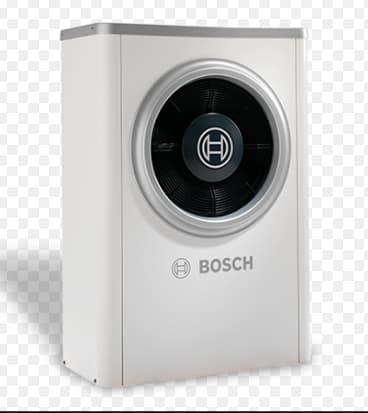
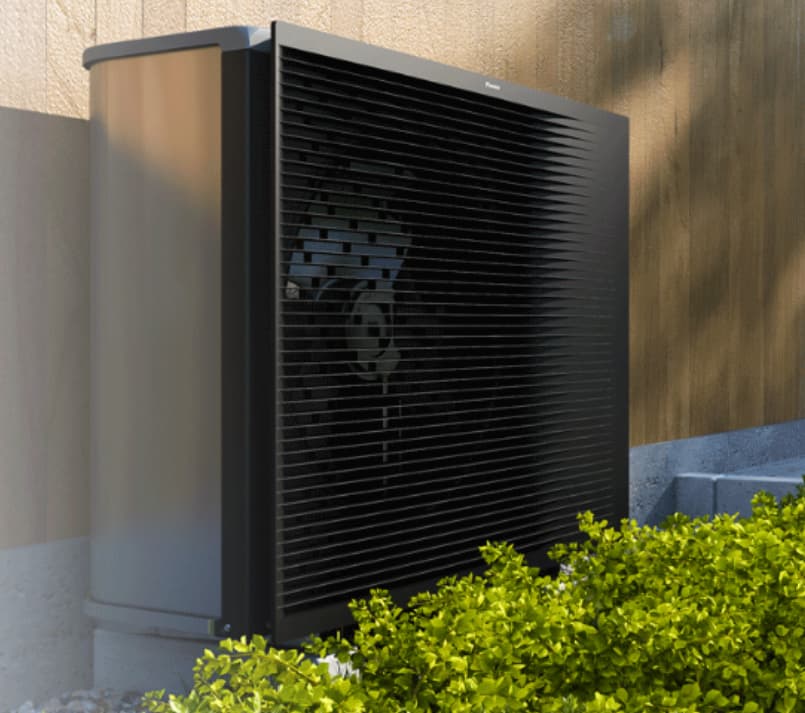
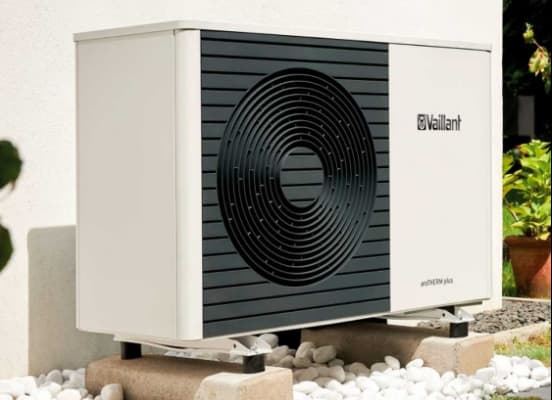
Selection of the 3 ugliest PAC Air Eau outdoor units (in my opinion)
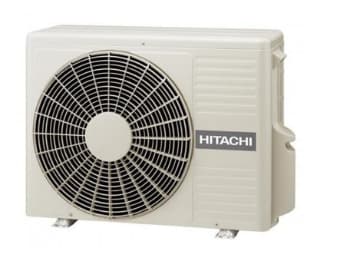
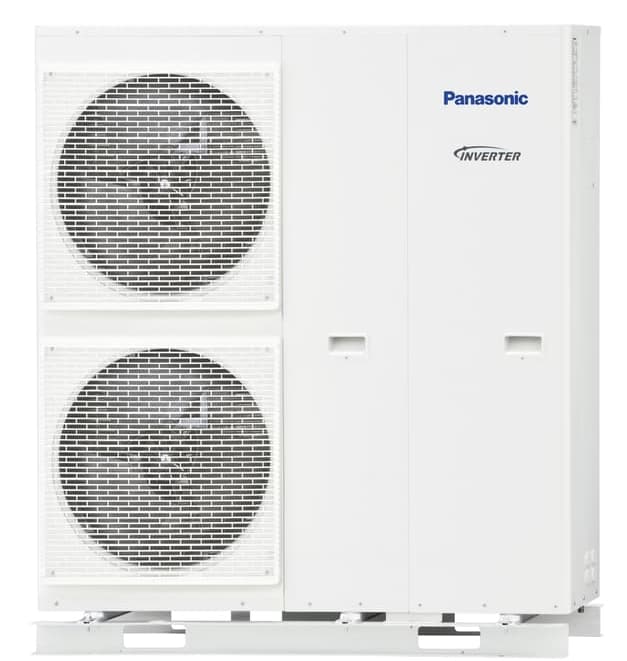
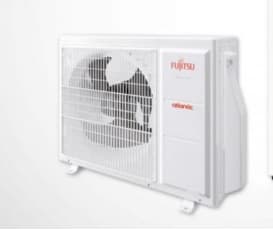
Globally, except for Daikin, the Japanese side makes no aesthetic effort on the outdoor unit. On the European side, we can see an evolution that aims to seduce the growing number of customers, given the aids or subsidies.
The Air-Water heat pump may need help in winter to ensure heating
A heat pump that operates with R410A or R32 refrigerant has its physical operating limits! Indeed, in certain regions where certain days of the year bring barely believable temperatures, the machine will be out of breath and will have to (in order to ensure the temperature requested by you) have recourse to an electric heating element which may vary between 3kW and 9kW or more depending on the model, or even the regional directives.
Consequence In a very cold year (which seems unlikely in the coming years), you may feel that your heat pump is using a lot of electricity. And with kWh prices always expected to rise, that's never pleasant.
Notice It is quite possible that the heat pump may not perform as well as it should over the course of a year. However, over the long term, the heat pump will tend to come closer to the performance test curves.
To learn more about heat pumps in cold weather, you can click on me. ❄️
Regular maintenance is required to preserve the components
The outdoor air-to-water heat pump, or any other heat pump model, contains a refrigeration circuit made up of more or less fragile elements that must be monitored regularly.
Indeed, in order to reduce the risk of leaks or overconsumption, it is important to carry out a regular check, approximately every two years. During this routine check, your installer will check a list of points of his own or determined by the standards in force. This will ensure that there are no leaks or anomalies that could increase electricity consumption to deliver the same power.
Consequence In many cases, you have to pay an annual or biannual fee to your installer to come and do the tests and give you a test certificate. Some machines can lose their warranty (for example on compressors often guaranteed for 5 years) if the test is not performed.
Notice A bit like a car, the maintenance of a heat pump is at the discretion of the owner. If you are lucky, the machine will never have a problem for many years. But if you are unlucky, the machine may have a problem after 2 years. If you don't want a maintenance contract, it can be expensive.
A heating system that is expensive to purchase
The installation of a heat pump can quickly come to significant sums between 15 and 30k€ or more depending on the country. Although the least expensive, the outdoor air water heat pump will become profitable after many years of electricity savings (if properly installed) compared to a system using fossil fuels or electricity. Calculations often lead us to values of amortization located between 9 and 12 years.
Consequence The slightest error in sizing or choice of installer can ruin the savings and extend the payback period by several years.
Notice State aid or other subsidies are a means that you should take advantage of now, as long as it is present and consequent, in order to ensure maximum profitability in the medium-long term. Depending on your income, it is possible that your installation will be subsidized to a third or half of its value.
Lack of suitability for connection to existing radiators
The performance of the heat pump, which runs on R410A or R32, tells us that the ideal situation is to have underfloor heating that allows us to heat at low temperatures. This way the heat pump works in ideal conditions and produces heat with a coefficient of performance at the highest level of its capacity.
If, however, you need or want to connect a heat pump to an existing water radiator system. You will need to run higher water temperatures through the pipes.
Consequence The heat pump will have to do more work, its COP will be lower, around 2.5 to 3, and the potential energy savings will be reduced. All of this generally leads to the recommendation that a heat pump should not be installed on radiators.
Notice Even high-temperature heat pumps capable of supplying radiators with water at 75°C or 80°C, for example, will be useful, but they will not have extraordinary coefficients of performance and will not result in significant savings. It is still possible to install low-temperature radiators, but they will have the disadvantage of being larger than the existing radiators.
All this being said, the slow but sure arrival of the R744 or CO2 gas in the heat pump world suggests a rather bright future in terms of the performance of heat pumps at high output temperatures! Indeed, the COPs with CO2 machines remain very respectable for very high water temperatures. And they work even better in winter.
A not so green machine
The energy balance of the heat pump is not so positive. In fact, it is more or less the same as that of a condensing boiler.
You are always told that the heat pump will allow you to pay 3 times less electric energy for the same amount of heating. But does it really consume less energy than oil or gas heating? Not that much, and the reason is simple. We forget to consider upstream that it is necessary to produce the electricity that the heat pump consumes. And today the processes of production of the electricity generate global returns lower than 40% approximately.
Consequence: Your purchase of a heat pump theoretically allows society to become a little more free of fossil fuels. But this will only be true when the national production has a renewable origin.
Opinion: The real arguments for buying a heat pump lie in the fact that you will be able to separate yourself from fossil fuels at your level and from their supply and security disadvantages. But as far as ecology is concerned, let's wait and see how electricity production evolves and how much of it is truly renewable.
An installation process that requires permits
You don't dream of asking for permission from your local council to install a heat pump, but that's what you'll have to do, unless you're a nice installer who will do it for you, provided you sign his estimate.
Consequence : Depending on the municipality or region, and on your particular case, these authorizations can take time, a few months in the best case, more than a year in extreme cases.
Notice : Most of the time, a few months are enough to obtain an agreement, sometimes less. This is still acceptable. Also, many installers use this argument of taking over your requests to get you to sign the estimate. Make sure that you do not start the installation work, as indicated on the official forms, before you have obtained a written authorization or agreement in principle of the grant with its amount.
Telephone pollution due to commercial canvassing 😉
Heat pumps being a rather attractive heating solution overall, despite the many disadvantages listed above, there are no longer any call centers harassing landline and cell phone numbers, from exotic countries (Madagascar, Tunisia, Algeria, Morocco, Mauritius, if you are wondering), in order to set up appointments in the agendas of the sales representatives who are then supposed to sell you the turnkey solution
Consequence This harassment is a source of anxiety for many people, some of whom do not know how to say no and let their interlocutor lead the conversation until they get an appointment.
Notice Be careful and do not answer questions that involve revealing information about yourself. Because believe it or not, the slightest leak that allows us to understand your profile a little better and to add to your famous digital identity will immediately be recorded in your file for all practical purposes for the next people who try their luck by calling you!
Would you like a heat pump quotation? Quickly fill in the form below and an army of seasoned salesmen will harass you to sell you the heat pump of your dreams! No, I'm kidding (well, I hope I am).

Julien G.
Julien, diplômé en ingénierie mécanique et spécialiste en génie climatique depuis 2009, s'est reconverti en rédacteur spécialisé en énergies renouvelables, avec une expertise en pompes à chaleur et panneaux solaires photovoltaïques pour l'habitat individuel.
